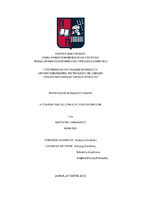Η επίδραση των ESG στην αξία των επιχειρήσεων

View/
Keywords
Αγοραία αποτίμηση ; Tobin’s Q ; Αποδοτικότητα ενεργητικού (ROA) ; Αποδοτικότητα ιδίων κεφαλαίων (ROE) ; Χρηματοοικονομική μόχλευση (DER) ; Μέγεθος εταιρίας ; Total asset ; Περιβάλλον ; Environment ; Κοινωνία ; Social ; Εταιρική διακυβέρνηση ; ESG ; Πετρελαϊκές εταιρίεςAbstract
The purpose of this thesis is to examine the impact of ESG indicators (Environmental, Social, Governance) on firm value, aiming to clarify the relationship between non-financial sustainability practices and market valuation, as reflected by Tobin's Q. The analysis focuses on a particularly critical and strategically important sector the oil industry providing empirical evidence for a sector characterized by intense environmental and social challenges, as well as high corporate governance demands.
The methodological approach relied on panel data from a sample of 204 oil companies covering the period from 2019 to 2024. Econometric techniques of fixed and random effects were employed to isolate the effects of ESG, Return on Assets (ROA), Return on Equity (ROE), Debt-to-Equity Ratio (DER), and company size (Total Assets) on Tobin's Q. The choice between fixed and random effects was determined using the Hausman test, while additional tests for overall significance and model fit assessment were also conducted.
The key findings clearly highlight the pivotal role of corporate governance (Governance), which emerged as the only ESG indicator with a statistically significant and positive impact on firm value, as measured by Tobin's Q. Conversely, the environmental (Environment) and social (Social) responsibility indicators, along with the aggregate ESG index, did not exhibit statistically significant effects on the market valuation of firms within this sector.
Moreover, firm size is identified as a significant determinant of value. The negative impact of return on equity (ROE) and return on assets (ROA) metrics raises interest for further exploration but is interpreted within the context of the peculiarities and risks specific to this industry. Meanwhile, the leverage indicator (DER) did not exhibit statistical significance in the majority of results.
The conclusions underline the decisive role of corporate governance in shareholder value creation, particularly in sectors with high capital intensity and regulatory pressure, such as the oil industry. Concurrently, the study indicates the limitations in the effectiveness of environmental and social policies as tools for enhancing market value, at least within the short- to medium-term horizon examined.
The contribution of this thesis is multifaceted, both theoretically and practically. First, it enhances international literature regarding the differentiated significance of accounting and non-financial measures in market valuation. Second, on a practical level, the findings suggest investors assess ESG strategies with heightened caution in the oil sector, highlighting the need to strengthen transparency, credibility, and substance in sustainability practices as prerequisites for converting them into genuine financial value.


